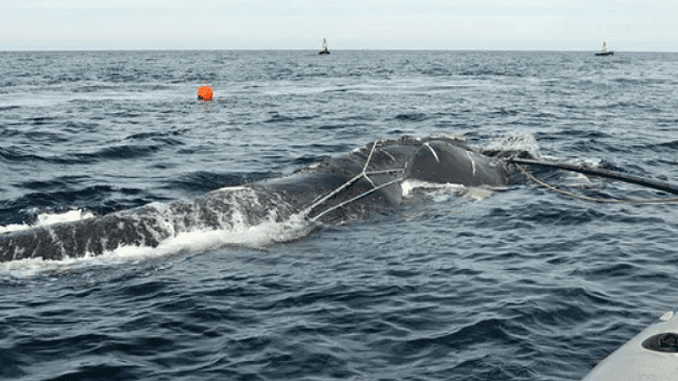
AUGUSTA, Maine, October 16, 2021 (ENS) – The Maine Lobstermen’s Association is suing the National Marine Fisheries Service, NMFS, and the Secretary of Commerce in a challenge to the agency’s new Atlantic Large Whale Take Reduction Plan modifications. But conservation groups, too, are suing the federal agency, as they object to the new final rule for different reasons.
The NMFS, also known as NOAA Fisheries, is an office of the National Oceanic and Atmospheric Administration within the U.S. Department of Commerce.
On August 31, NOAA Fisheries announced new regulations for the lobster fisheries operating in the Northeast United States to help save endangered North Atlantic right whales by reducing their risk of entanglement in fishing gear.
“NOAA Fisheries and our partners are dedicated to conserving and rebuilding the North Atlantic right whale population, which is critically endangered and declining,” the agency said.
The decline began in 2010, and accelerated when 17 right whale deaths were documented in 2017, leading to the declaration of an ongoing Unusual Mortality Event. Since then, 34 right whales have died and 16 have been seriously injured, primarily due to entanglements and vessel strikes.
Patrice McCarron, executive director of the Maine Lobstermen’s Association, said the federal agency is placing an “unwarranted burden” on the Maine lobster fishery. “NMFS got it wrong. The science does not support the agency’s plan. Using worst case scenarios that hold Maine lobstermen accountable for right whale deaths occurring in Canada won’t help protect right whales, but it will decimate Maine’s lobster industry.”
McCarron says “the most current, best available scientific evidence documents a change in right whale migration patterns away from Maine waters and into Canada and other areas.”
The Maine Lobstermen’s Association says it is “committed to action to recover the North Atlantic right whale but the species cannot rebuild without a conservation plan supported by scientific evidence and comparable measures implemented in Canada and the U.S. shipping industry.
“NMFS has mandated that Maine lobstermen reduce risk to right whales by an additional 98 percent over the next 10 years based on the worst-case scenario instead of using best available data and realistic assumptions,” McCarron said. “The final rule is just the first round of economic impacts and future restrictions will likely destroy Maine’s iconic lobster fishery.”
But Janet Coit, assistant administrator for NOAA Fisheries, who also serves as acting assistant secretary of commerce for oceans and atmosphere and deputy NOAA administrator doesn’t see it that way.
“This rule represents years of work and collaboration on the part of fishermen, scientists, conservationists, and state and federal officials to develop strategies to reduce the dangers faced by North Atlantic right whales,” Coit said.
NOAA Fisheries anticipates the new regulations will achieve an estimated 69 percent reduction in the risk of death and serious injuries caused by entanglement in these fisheries, by:
- – Reducing the number of buoy lines that link the fisherman’s floating surface buoy to the pot or trap in the water;
- – Weakening the remaining lines so that whales can break free before becoming seriously injured; and
- – Improving how fishing gear is marked so NOAA Fisheries and partners can better identify the type of fishing gear associated with entanglements when they do occur, thereby informing future risk reduction measures.
But then, on September 9, three environmental groups – the Center for Biological Diversity, the Conservation Foundation and Defenders of Wildlife filed a supplemental/amended complaint to add new facts and new claims to previous legal actions in 2018.
They argue that federal management of the lobster fishing industry violates federal law because it leaves the whales vulnerable to fatal entanglement in fishing lines and nets.
The groups are challenging the NOAA Fisheries May 2021 Biological Opinion on the issue as unlawful under the Endangered Species Act and the Administrative Procedure Act, APA, and challenging the final rule as unlawful under the Marine Mammal Protection Act and the APA. The groups are also challenging NMFS’s ongoing failure to comply with its mandatory duty to reduce right whale serious injury and mortality to below statutorily-established levels.
At the end of September, Governor Janet Mills of Maine, a Democrat, took sides.
Governor Mills says a federal judge has granted her administration the ability to intervene in the lawsuit, and she is doing so to help protect the fishing industry. Intervening is a “critically important step in the state’s efforts to support Maine’s vital lobster industry,” the governor said.
Mills said her administration has contracted a law firm that has experience litigating Endangered Species Act issues to represent the state as an intervenor.
Featured image: Entanglement responders from the Georgia Department of Natural Resources work to remove gear from an entangled North Atlantic right whale, January 5, 2017 (Photo courtesy NOAA)
© 2021, Environment News Service. All rights reserved. Content may be quoted only with proper attribution and a direct link to the original article. Full reproduction is prohibited.



